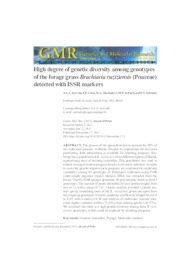High degree of genetic diversity among genotypes of the forage grass Brachiaria ruziziensis (Poaceae) detected with ISSR markers.
High degree of genetic diversity among genotypes of the forage grass Brachiaria ruziziensis (Poaceae) detected with ISSR markers.
Author(s): AZEVEDO, A. L. S.; COSTA, P. P.; MACHADO, M. A.; PAULA, C. M. P. de; SOUZA SOBRINHO, F. de
Summary: The grasses of the genus Brachiaria account for 80% of the cultivated pastures in Brazil. Despite its importance for livestock production, little information is available for breeding purposes. Embrapa has a population of B. ruziziensis from different regions of Brazil, representing most of existing variability. This population was used to initiate an improvement program based on recurrent selection. In order to assist the genetic improvement program, we estimated the molecular variability among 93 genotypes of Embrapa's collection using ISSR (inter-simple sequence repeat) markers. DNA was extracted from the leaves. Twelve ISSR primers generated 89 polymorphic bands in the 93 genotypes. The number of bands identified by each primer ranged from two to 13, with a mean of 7.41. Cluster analysis revealed a clearly distinct group, containing most of the B. ruziziensis genotypes apart from the outgroup genotypes. Genetic similarity coefficients ranged from 0.0 to 0.95, with a mean of 0.50 and analysis of molecular variance indicated higher variation within (73.43%) than among species (26.57%). We conclude that there is a high genetic diversity among these B. ruziziensis genotypes, which could be explored by breeding programs.
Publication year: 2011
Types of publication: Journal article
Unit: Embrapa Dairy Cattle
Keywords: Genetic variability, Molecular markers, forage
Observation
Some of Embrapa's publications are published as ePub files. To read them, use or download one of the following free software options to your computer or mobile device. Android: Google Play Books; IOS: iBooks; Windows and Linux: Calibre.
Access other publications
Access the Agricultural Research Database (BDPA) to consult Embrapa's full library collection and records.
Visit Embrapa Bookstore to purchase books and other publications sold by Embrapa.

